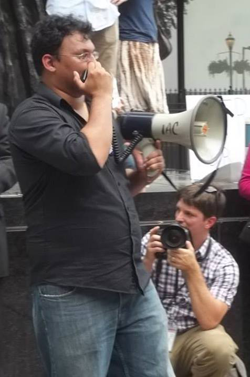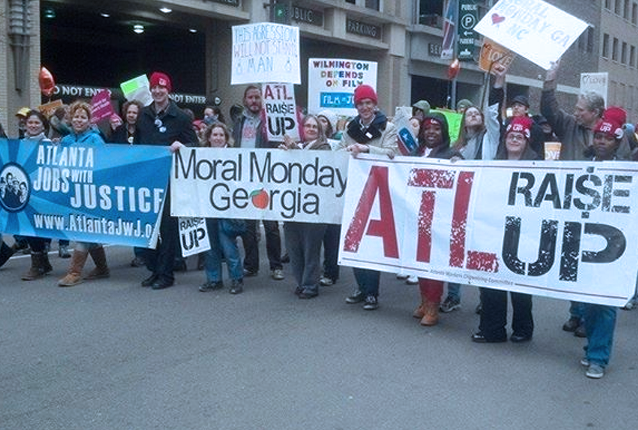Fifty-four years after the historic lunch counter sit-ins launched the civil rights era, in which four black students sat down at a segregated Woolworth’s lunch counter and demanded to be served, North Carolina once again captured the nation’s attention with the launch of the Moral Monday movement last year. The weekly protests targeting state legislators has since spread throughout the south, including Georgia, home of Atlanta Jobs With Justice.
To find out how Moral Monday has spread so successfully, I sat down with Neil Sardana, an organizer with Atlanta Jobs With Justice, to get his take on this growing movement. Check out my email interview with Neil, and if you live in Georgia, be sure to RSVP for tonight’s demonstration.
JW: The Moral Monday protests began in North Carolina last year. How did the demonstrations start and who started them?
NS: As far as I know, Moral Monday started in North Carolina as a result of years of building and planning led by the Historic Thousands on Jones Street (HKonJ). HKonJ built deep connections with community and faith-based organizations to address a host of human rights and social justice concerns in North Carolina. The demonstrations effectively launched on February 8 last year when tens of thousands of people marched from Shaw University to the State Capitol in Raleigh. After a successful wave of conservative victories in the 2012 elections, Moral Monday was a response to the resulting all-out right-wing assault on the state’s residents. Conservative lawmakers introduced vicious cuts to policies such as federal unemployment benefits and Medicaid while simultaneously introducing infamous “voter ID” laws to disenfranchise voters.
JW: How did Moral Monday spread to Georgia?
NS: Moral Monday spread to Georgia because there were several of us defending the home of disabled Desert Storm veteran Mark Harris who had been struggling with Fannie Mae to prevent his eviction and keep his home. Community members, including members of Atlanta Jobs With Justice, heard of the Moral Monday effort in North Carolina and discussed the idea of building a similar movement in Georgia while sitting on Mark’s lawn defending his home. We realized that this movement was needed in Georgia, where military veterans and workers like Mark could be laid off from their jobs and evicted from their homes.
These first activists further engaged Atlanta Jobs With Justice and reached out to a variety of community groups, faith organizations and labor unions to begin the conversations and meetings to develop Moral Monday GA. We met for some time to develop a mission and agenda and decided one of the highlight issues was our demand to expand Medicaid in Georgia. These collective planning meetings led us to our first major Moral Monday GA event on the first day of the 2014 Georgia legislative session. Reverend Barber of Moral Monday North Carolina joined us to provide encouragement and support for moving forward together.
JW: Who is involved in Moral Monday in Georgia? What are your demands?
NS: Moral Monday GA is a collective of community organizations, faith-based groups, churches, labor unions, students and individuals. We are young and old; we are black, brown, Asian and white; we are women, men and transgender who are gay, lesbian, bisexual and straight; we are immigrants and citizens; many of us are unemployed, low-income, uninsured or undocumented. We are from all faiths. We are not Republican or Democrat; instead we are open to all who stand up in our society for what is fair, just and right. We are standing up to politics as usual where those with the most power, influence and money have their way and everyday people are just pushed aside.
We are demanding that Georgia expand Medicaid to provide over 600,000 people in our state with access to health care, which would create over 70,000 jobs. We demand that our state protect the unemployment benefits of hardworking Georgians, including school workers whose benefits are on the chopping block. We demand a repeal of Georgia’s Stand Your Ground law and the enactment of reasonable gun safety provisions. We demand that our voting rights be protected and expanded. We demand that our state raise the minimum wage so that workers don’t have to choose between paying for food, rent or medicine for their families. We demand that immigrants be treated with fairness and respect and that undocumented people be given the right to come out of the shadows. We demand that women and LGBT people be treated with equality, dignity, and respect.
JW: Moral Monday demonstrations have featured several instances of nonviolent civil disobedience resulting in arrest. Why are activists using these tactics?
NS: Moral Monday GA has utilized acts of nonviolent civil disobedience in our movement to fight for what is right and just. The reason we have used these tactics is because as I said before today’s politicians have completely pushed aside everyday people in favor of big business interests who have essentially captured our political system and bent it to their will. We are committed to standing up for everyday citizens and calling on our politicians and leaders to do the same.
Unfortunately, when we make this call to our political leaders, it often falls on deaf ears. During the 2014 state legislative session, Moral Monday GA took 73 arrests as a result of principled nonviolent civil disobedience that included 12 active members of the Atlanta Jobs With Justice coalition. In fact, the overall majority of individuals arrested were from organizations affiliated with Atlanta Jobs With Justice.
To be clear though, our movement doesn’t require that anyone conduct civil disobedience, and we are open to all whether or not they are willing to engage in nonviolent civil disobedience. However, with our deep commitment to these issues and towards fighting for what is moral and right, many of us within the Moral Monday movement are more than ready to conduct nonviolent civil disobedience in our efforts.
JW: Is this particularly significant in the south?
NS: Moral Monday is quite significant for the south. This is a movement that has originated in the south and is spreading primarily throughout the south. We are seeing this movement spread from North Carolina to Georgia and further to South Carolina, Florida, Alabama and Texas. We are hearing all the time more people from different states being interested in building the Moral Monday movement and spreading it further. I have even heard that some places in the north are doing Moral Monday actions because they have been excited about what is happening here in the south. Lastly, Moral Monday is the largest collective people’s movement built and spread throughout the south since the Civil Rights era. We believe we are seeing history in the making.
JW: What’s next for Atlanta Jobs With Justice?
NS: We will continue to support building Moral Monday GA. Given that our legislative session is only part-time and is now over for this year, we will focus on a broader set of issues through our campaigns, including immigration reform, raising the minimum wage, expanding Medicaid and access to health care, defending the unemployed, and fighting for low-wage workers. And of course, we will continue to raise public awareness regarding the multitude of right-wing bills attacking everyday Georgians that were passed this year and pressure Governor Nathan Deal to veto them.






